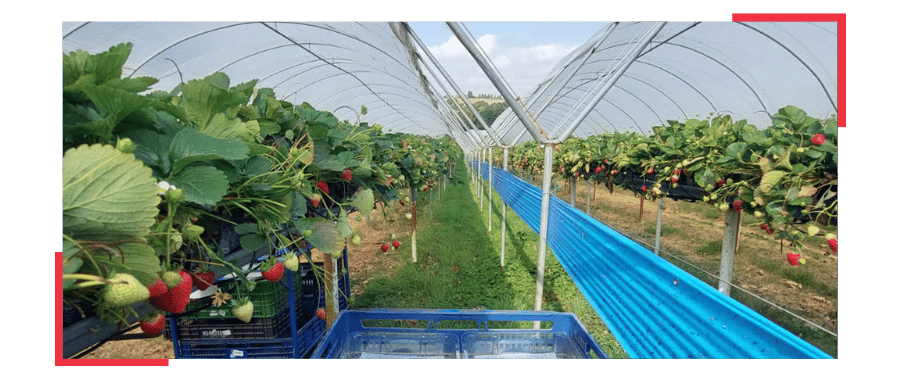
“It’s out the public eye. You can’t ****ing even still write about it. There’s nothing to write about. It’s done. It’s finished.”
Hi {{ First name | there }},
This has been one of those hectic weeks that proves our revelations about dodgy deals and bald-faced lies are making a real difference in the world. So, let me give you a run-down of everything that happened, and a little behind-the-scenes look at what it took to get there.
First up, the Serious Fraud Office announced that it opened an investigation related to the Thurrock investments scandal – which we broke open five years ago.
Our Bureau Local editor Gareth Davies first started looking into how councils across the UK were taking on enormous debts in the wake of the local government funding crisis in 2019. In particular, he was looking at councils borrowing money from each other. Top of the list was Thurrock council in Essex, which had borrowed £1bn.
Thurrock invested £655m of that into a solar farm scheme pushed by a businessman called Liam Kavanagh. But, as we reported, a lot of the cash disappeared. Kavanagh spent it on things that I’m not sure are essential to running a solar farm: a Bugatti, a yacht and a jet. He also bought some gaudy interior design features like Swarovski curtains and a £250,000 rotating bed. Money can’t buy you taste.
Gareth published his first story in 2020. But if you’ve met Gareth, you’ll understand it was never going to end there. Usually, when you’re uncovering a big scandal like this, you never get the whole story in the first go. And Gareth kept digging.
Probably the most remarkable thing Gareth got his hands on was a video of Kavanagh being dropped off at an airport in Bournemouth to catch his private jet. After our first article came out, Kavanagh was obviously unhappy and he was recorded by a dash cam venting to his driver. He even asks whether the dash cam is recording and is assured it isn’t. Then he launches into a long tirade about our reporting and how he plans to get away from it all.
Kavanagh described how a “bomb got dropped” with the “****ing article shit” but that it had made up his mind to wind up his company, Rockfire Investment Finance – the very one the SFO is now investigating. That, he reckoned, would insulate him from further scrutiny.
“It’s out the public eye. You can’t ****ing even still write about it,” Kavanagh says on the video. “There’s nothing to write about. It’s done. It’s finished.”
But that wasn’t his only strategy to stop us writing about his dealings. He also used legal threats. He had hired Carter-Ruck, perhaps the most aggressive libel firm in the UK. They’re notorious for the crooks and oligarchs they have represented, sending letters designed to stop journalists and whistle-blowers from bringing the truth to light.
One such stinky letter Carter-Ruck sent us on Kavanagh’s behalf ended with a clear threat: “For the avoidance of doubt, our client is considering all legal remedies available to him, including issuing proceedings in respect of the matters raised in this letter.”
Kavanagh’s plan didn’t quite work out. We carried on publishing, with our most detailed story coming out in July 2023 alongside a Panorama documentary on the BBC.
On the council side, things came to a crashing halt. Senior council officials resigned, including the chief financial officer who had made all the deals with Kavanagh. Thurrock was effectively declared bankrupt, with losses estimated at £200m. The council’s coffers were then drained even further, with at least £50m going to administrators and consultants. The Conservatives, who’d been running the council, got swept away in last year’s elections.
The council sued Kavanagh and accused him of submitting forged evidence to the high court to cover up a fraud, which he denied.
And then this week, the SFO finally announced its investigation and ordered financial institutions to hand over banking records for a potential criminal case against Kavanagh’s company.
Kavanagh has always denied any kind of wrongdoing and said the council is blaming him for its own mismanagement. When we contacted Carter-Ruck to ask Kavanagh some questions recently, a PR agency responded rather than the law firm. It made me wonder whether the heat around him had become too much even for some of his lawyers.
But the true tragedy is that all of this is at the expense of taxpayers. The millions that disappeared led to services being cut and council tax being hiked. It’s the biggest council scandal in recent history. And it’s not even unique to Thurrock. At least seven councils have gone bust in the past few years. This speaks to widespread mismanagement and a lack of accountability. There’s no discernable plan from the government to get the situation under control.
I’m incredibly proud that we were the catalyst that exposed this. TBIJ is a small non-profit that really hustles to bring in the money we need to do the big investigations we do. It’s been six years since Gareth started looking into it. We stuck with it despite everything that was thrown at us and when no one else cared. We kept finding more and more evidence until the authorities finally decided to take this seriously.
News you can Vuse?
A group of consumers in the US has launched a class action lawsuit against British American Tobacco for allegedly conning them into thinking its Vuse vapes were carbon neutral. BAT was so proud of the professed green credentials that it sailed a yacht down the Thames with a massive green sail emblazoned with the words “The first global carbon neutral vape brand” for all to see.
But we checked it out and revealed that BAT was banking junk carbon credits, suggesting Vuse was just using the green shtick as a marketing trick. Now, consumers have picked up our revelations and are demanding compensation – it could cost the defendants more than $5m, they say.
In the court claim, which was filed in California, the group say they were drawn towards Vuse because of these green credentials. They say the “carbon neutrality claims are false and misleading because all four [carbon off-setting] projects fail to provide genuine, additional carbon reductions”.
A BAT spokesperson said in November the “carbon neutral” claim had been independently validated in 2021 and that all Vuse communications around carbon neutrality were terminated in December 2023. However, TBIJ found that the claims are still on the company’s website.
Factchecked!
Each week we reveal a fascinating fact from our reporting…
Did you know?
Some managers and supervisors call many of the migrant workers who come to the UK to work on British farms by their assigned numbers instead of their names.
Find out more
The seasonal worker visa was initially launched in 2019 to plug labour shortages after Brexit. Since then, there have been widespread claims of wage theft, discrimination and alleged abusive behaviour from employers.
Read more about the experiences of migrants on seasonal worker visas in the UK here.
Sunk hopes for recouping Abramovich’s tax
When we exposed an elaborate tax-dodging scheme benefitting the Russian billionaire Roman Abramovich, we didn’t think that the person getting slammed would be the tax commissioner of Cyprus. But that’s exactly what’s happened.
Sotiris Markides, who heads up Cyprus’s tax agency, was asked in parliament why he had been unable to recoup €14m in unpaid VAT due on Abramovich’s fleet of luxury yachts.
The Cypriot tax agency had been trying to get its hands on the money, but the case was stuck in the courts for years. In the end, it turned out that the companies that were liable had disappeared. In illicit international finance, the bad guys can often just disappear in a puff of smoke.
As Markides put it: “As a matter of fact, due to the absence of a legal entity and active representatives, it is not possible to recover the said debt – not even through a company revival process.”
Instead, he said, MPs should change the law to close these loopholes. “We need changes to prevent companies from hiding behind legal gaps and faceless structures,” he said.
We led the ground-breaking investigation into Abramovich’s taxes – in partnership with the BBC, the Guardian, OCCRP, the International Consortium of Investigative Journalism, Paper Trail Media, and CiREN in Cyprus – and revealed that the oligarch had used a network of offshore companies to set up a sham cruise-rental scheme and dodge millions in VAT. (He said he was always acting on independent tax and legal advice and denied knowing about any alleged deception to evade taxes.)
Teaching kids that fossil fuels are the future
I didn’t think I could still be shocked by fossil fuel companies’ lobbying tactics, but one story we reported this week was remarkable.
The company behind the Rosebank oilfield in the North Sea funded a computer game aimed at UK school children as young as 7, promoting the idea that fossil fuels can be part of a future energy mix.
The site that hosted the game, where teachers could find free resources to use in science lessons, even appeared to admit it was designed to lobby children, stating that the game “aligns with our work to build future talent pipelines and secure permission to operate at a time of sensitivity around fossil fuels, particularly in light of approval for the Rosebank development”.
The story was first reported by the Norwegian publication E24.no. We picked it up and the UK-based Association for Science Education promptly said that it would accelerate the timeline for shutting down the site, which – as well as hosting this game – was sponsored by ExxonMobil, the world’s third most polluting company.
Protections for fruit pickers
Last, but certainly not least, a recent government-commissioned report came out clearly in favour of helping protect seasonal farm workers from exploitation. We exposed the grim conditions these workers often face.
Tens of thousands of workers travel to the UK every year on a six-month seasonal worker visa, with up to 70% of them taking out loans for visa and travel costs. These massive costs leave them vulnerable to exploitation as they desperately try to repay their debts or make some money to send home.
The report, which was done for the Department for Environment, Food & Rural Affairs (Defra), said British farms and supermarkets could pay travel and visa costs for these workers. The concept isn’t exactly new. In some cases in the US and Canada, employers must cover some or all of these kinds of costs and pay for seasonal workers’ accommodation.
So what does Defra think? A spokesperson said this policy wasn’t in its plans and “to suggest otherwise is completely false”. Either way, awareness around this subject is growing – and its something the government will have to grapple with. At least one worker has ended up taking the government to court, demanding greater protections.
What we’ve been reading
🔴 One of the UK’s largest mining groups has been told to pay as much as $630m to a Mexican community whose land it illegally mined for gold source-material.org
🔴 This (paywalled) analysis goes into the nitty gritty of Ukraine’s attack on Russian bomber planes wsj.com
🔴 Three years after the deaths of Dom Phillips and Bruno Pereira, Indigenous peoples continue their dangerous work to protect the Amazon guardian.com
Thanks,
Franz
Franz Wild
Editor

ADVERTISEMENT
Receive Honest News Today
Join over 4 million Americans who start their day with 1440 – your daily digest for unbiased, fact-centric news. From politics to sports, we cover it all by analyzing over 100 sources. Our concise, 5-minute read lands in your inbox each morning at no cost. Experience news without the noise; let 1440 help you make up your own mind. Sign up now and invite your friends and family to be part of the informed.









